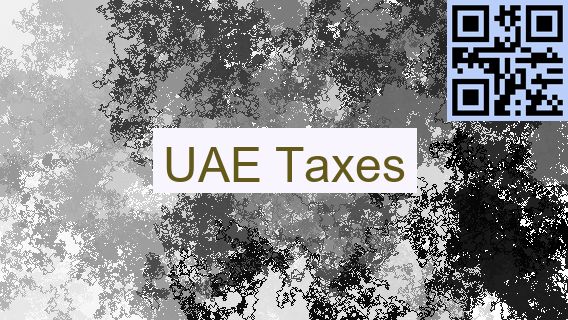UAE Taxes
The UAE is a country located in the Middle East and is a federation of seven emirates. Dubai, Abu Dhabi, Sharjah, Ajman, Umm Al Quwain, Ras Al Khaimah, and Fujairah are the seven emirates. The UAE is a popular destination for both tourists and businesses and is a leader in the region in terms of economic growth and development. With this growth and development has come to the implementation of taxes.

Taxes are a necessary evil. They are the means by which the government can generate revenues and use them to provide essential public services and infrastructure. The UAE has adopted a system of taxation that is simple and efficient. It is a value-added tax system (VAT) that is applied to certain goods and services in the country. The VAT rate is 5% and is applicable to all goods and services except for a few that are exempt from taxation.
Income tax is one of the main taxes in the UAE and is applicable to both residents and non-residents. Non-residents are subject to a flat rate of 20% on all taxable income. Residents are subject to a progressive tax rate which can range from 0% to 15% depending on the amount of income earned. There is also a 2% tax on certain real estate transactions, such as the sale of a property.
The UAE has also implemented a number of other taxes, such as corporate tax, excise tax, and stamp duty. Corporate tax is applicable to all companies operating within the UAE and is at a rate of 55%. Excise tax is applied to certain goods, such as cigarettes, alcohol, and fuel, and is at a rate of 100%. Stamp duty is applicable to certain documents and transactions and is at a rate of 0.5%.

The UAE has also implemented a number of taxes on foreign investments in the country. These taxes are designed to encourage foreign direct investments and discourage speculative investments. The withholding tax is a tax applied to dividends and interests paid on foreign investments and is at a rate of 10%. Capital gains tax is applicable to profits earned on the sale of investments and is at a rate of 10%.
The UAE also has a number of taxes related to the import and export of goods. These taxes are designed to protect the local economy and ensure that the country remains competitive in the global market. Customs duties are applicable to all imported goods and are at a rate of 5%. Value-added tax is applicable to all imported goods and services and is at a rate of 5%.
In conclusion, the UAE has implemented a comprehensive system of taxation that is designed to generate revenues and maintain the country’s economic growth and development. The taxes are applicable to both residents and non-residents and include income tax, corporate tax, excise tax, stamp duty, withholding tax, and capital gains tax. The UAE also has a number of taxes related to imports and exports, such as customs duties and value-added tax, which are designed to protect the local economy and ensure the country’s competitiveness in the global market.

Eventually
Dubai, Abu Dhabi, Sharjah, Ajman, Umm Al Quwain, Ras Al Khaimah, and Fujairah are the seven emirates. The UAE has also implemented a number of other taxes, such as corporate tax, excise tax, and stamp duty. Excise tax is applied to certain goods, such as cigarettes, alcohol, and fuel, and is at a rate of 100%. The taxes are applicable to both residents and non-residents and include income tax, corporate tax, excise tax, stamp duty, withholding tax, and capital gains tax.
#investing #investments #taxes #uae #service #investment #country #state #design #good #tax #both #taxis #rate #income #designed #area #commodity #services #pace #applicable #incomeplan #goods #nation



